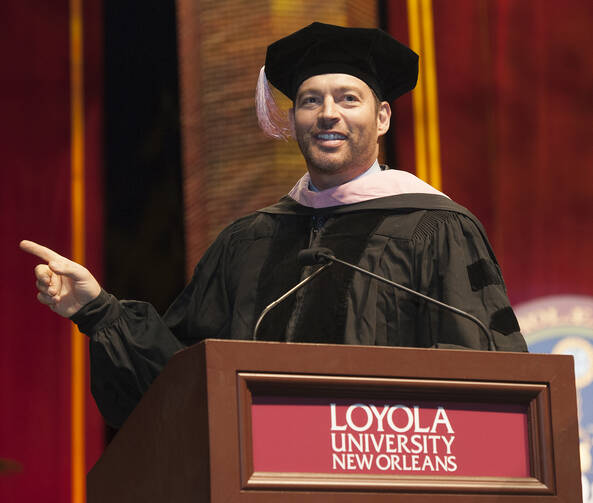What’s so great about a Jesuit education?
It’s a fair question, given the bills that parents and students face these days. That’s not to say that Jesuit colleges are more expensive than comparable institutions of higher learning. The cost of tuition, room and board also varies widely from school to school. Still, the price tag for any Jesuit college might prompt anyone to ask: Is it really worth it?
It’s also a common question for people unfamiliar with Jesuit education: What’s the big deal? Last year, my nephew, now a high school senior, was musing aloud about what college he’d like to attend. Not surprisingly, my first question for him was whether he had considered any Jesuit schools. He was noncommittal, as were his parents. Since neither my nephew nor his parents attended Jesuit schools, they wondered what the fuss was about. And why go out of your way to explore something, much less pay a premium, if you don’t know what you’re getting? Sometimes I compare this to lobster. If you’ve ever enjoyed a sweet Maine lobster, you might be willing to pay a few extra dollars for it in the future. But if you’ve never had lobster, and you see the high price on a menu, you might think, “Meh. I can live without it.”
Over the past few years, I’ve been happy to be invited to speak at Jesuit colleges and universities, and events like the Ignatian Family Teach-in. By now I’ve probably met hundreds of young people from “our” schools. And last month I visited three Jesuit schools at commencement: Gonzaga University in Spokane, Creighton University in Omaha and Canisius College in Buffalo. In light of all these experiences, I want to say this: I’m amazed by what happens at Jesuit colleges and universities.
Much of this amazement comes from meeting not just administration, faculty and staff, or fellow Jesuits, as helpful as that is, but another group: students and their parents. Admittedly, on commencement weekends I’m seeing the kids on one of the happiest days of their lives. Also, the students who approach me are a self-selected group. Not every young man or woman wants to talk with a middle-aged priest on graduation day!
Nonetheless, what I hear is best summed up by what a young woman from Gonzaga said to me: “I loved, loved, looooved my Jesuit education!” When pressed, they’ve told me three things that stand out.
First, cura personalis, that educational goal of caring for the “whole person.” Every college worth its salt cares for the intellect, and perhaps the body, but Jesuit institutions are committed to the care of the whole person—which includes the soul. By encouraging students to attend to their spiritual lives, inviting them to Masses and retreats, as well as offering them service opportunities rooted in faith, they try to care for the whole person. In that way they help them become whole people.
Second is the rather elusive concept of the magis—the more, the better, the greater for God. It comes from the Jesuit motto Ad Majorem Dei Gloriam (“For the Greater Glory of God”) and, more fundamentally, from the Spiritual Exercises of St. Ignatius Loyola. If you would be willing to work hard to follow a “temporal” leader you admire, wrote Ignatius, “how much more” would you be willing to do to follow Jesus? In Spokane, I asked a smiling young graduate what most defined his time at Gonzaga. He threw his head back, looked skyward and shouted, “Magis!”
Third is the idea of being men and women for others. The original expression, from a talk to Jesuit alumni by the former Jesuit superior general Pedro Arrupe, was “men for others.” Sometimes it’s rendered “men and women for and with others,” which is a bit of a mouthful. It means, in short, that a good life is an other-directed life. During the commencement at Canisius, all the students who had signed up for a year’s service after graduation—in the Jesuit Volunteer Corps, the Mercy Corps, Teach for America and other service organizations—were asked to stand and be recognized for their commitment. It was an admirable number.
After the Baccalaureate Mass at Creighton University, I met the beaming parents of a soon-to-be-graduate. They gushed about the education their daughter had received and told me how much it had meant to them as well. It was moving to listen to them. The night before they asked their daughter what she would change about her last four years. “Nothing,” she said.
As I said, the students I meet with may not be a representative bunch. (I’ve heard a few stories of students at Jesuit colleges who don’t know what a Jesuit is.) And I’m biased, of course. But the more I meet with Jesuit college students, the more I am convinced that there is something special here.
Happily, my nephew agrees. He’s starting at Fordham in September.








